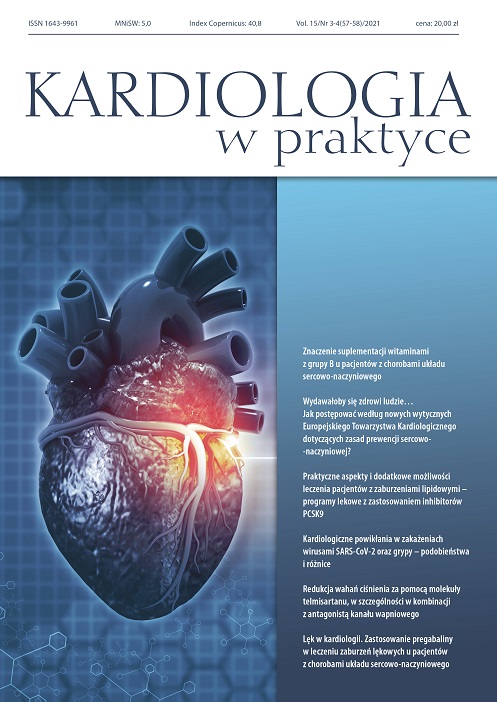Praktyczne aspekty i dodatkowe możliwości leczenia pacjentów z zaburzeniami lipidowymi – programy lekowe z zastosowaniem inhibitorów PCSK9 Artykuł przeglądowy
##plugins.themes.bootstrap3.article.main##
Abstrakt
Inhibitory PCSK9 to przeciwciała monoklonalne przeciwko PCSK9, czyli konwertazie proproteinowej subtylizyny/keksyny typu 9. Leki te wykazują wysoki potencjał redukcji stężenia cholesterolu LDL i mają szczególne zastosowanie jako element terapii skojarzonej, trójlekowej ze statynami i z ezetymibem. Inhibitory PCSK9 są lekami zalecanymi w wytycznych Europejskiego Towarzystwa Kardiologicznego. Obecnie w Polsce dysponujemy coraz szerszym panelem leków hipolipemizujących. Możliwą opcją terapeutyczną jest program lekowy Narodowego Funduszu Zdrowia leczenia zaburzeń lipidowych z inhibitorami PCSK9.
Pobrania
##plugins.themes.bootstrap3.article.details##

Utwór dostępny jest na licencji Creative Commons Uznanie autorstwa – Użycie niekomercyjne – Bez utworów zależnych 4.0 Międzynarodowe.
Copyright: © Medical Education sp. z o.o. This is an Open Access article distributed under the terms of the Attribution-NonCommercial 4.0 International (CC BY-NC 4.0). License (https://creativecommons.org/licenses/by-nc/4.0/), allowing third parties to copy and redistribute the material in any medium or format and to remix, transform, and build upon the material, provided the original work is properly cited and states its license.
Address reprint requests to: Medical Education, Marcin Kuźma (marcin.kuzma@mededu.pl)
Bibliografia
2. Schwartz GG, Steg PG, Szarek M et al. ODYSSEY OUTCOMES Committees and Investigators. Alirocumab and Cardiovascular Outcomes after Acute Coronary Syndrome. N Engl J Med. 2018; 379: 2097-107.
3. Cho L, Rocco M, Colquhoun D et al. Clinical Profile of Statin Intolerance in the Phase 3 GAUSS-2 Study. Cardiovasc Drugs Ther. 2016; 30: 297-304.
4. Visseren FLJ, Mach F, Smulders YM et al. 2021 ESC Guidelines on cardiovascular disease prevention in clinical practice. Eur Heart J. 2021; 42: 3227-337. http://doi.org/10.1093/eurheartj/ehab484.
5. Knuuti J, Wijns W, Saraste A et al. 2019 ESC Guidelines for the diagnosis and management of chronic coronary syndromes. Eur Heart J. 2020; 41(3): 407-77. http://doi.org/10.1093/eurheartj/ehz425.
6. Mach F, Baigent C, Catapano AL et al. 2019 ESC/EAS Guidelines for the management of dyslipidaemias: lipid modification to reduce cardiovascular risk. Eur Heart J. 2020; 41(1): 111-88.
7. Giugliano RP, Pedersen TR, Park JG et al. Clinical efficacy and safety of achieving very low LDL‑cholesterol concentrations with the PCSK9 inhibitor evolocumab: a prespecified secondary analysis of the FOURIER trial. Lancet. 2017; 390: 1962-71.
8. Koskinas KC, Windecker S, Pedrazzini G et al. Evolocumab for Early Reduction of LDL Cholesterol Levels in Patients With Acute Coronary Syndromes (EVOPACS). J Am Coll Cardiol. 2019; 74(20): 2452-62.
9. Charytan DM, Sabatine MS, Pedersen TR et al. Efficacy and Safety of Evolocumab in Chronic Kidney Disease in the FOURIER Trial. J Am Coll Cardiol. 2019; 73: 2961-70.
10. Program Lekowy Narodowego Funduszu Zdrowia. (access: 20.10.2021).
11. Glowczynska R, Hus A, Raszeja-Wyszomirska J et al. Are the proprotein convertase subtilisin/kexin type 9 inhibitors new therapeutic chance for patients with familial hypercholesterolaemia and liver failure? Eur Heart J. 2018; 39(27): 2602. http://doi.org/10.1093/eurheartj/ehy361.
